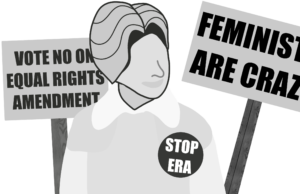There is no place for deficiency in diversity
When you open a history book, no matter for which grade, you will see the overwhelming accomplishments of many who came before us, but not everyone. People with different ethnicities, sexual orientations or other differences are too often omitted from the pages — sometimes the only tie between the future of the country and its past. By leaving these critical figures out, we are hiding part of history, rejecting people’s lives and accomplishments, and eliminating the contributions they fought so hard to make.
To address this, the state legislature has been making strides in trying to combat this deficiency of diversity. They signed Senate Bill 48, the Fair, Accurate, Inclusive and Respectful (FAIR) Education Act, into law on July 14, 2011, strengthening the prohibition of racism and discrimination in the education code and making sure history is portrayed with further diversity.
However, the law did not go into effect until 2012 and was not even predicted to make a difference until 2015. Looking back, I do not remember anything changing in those years.
Finally, on July 14, 2016, the California state school board adopted a new framework for history and social science as a guide for implementing the FAIR Act. The framework is now being considered by local districts statewide.
On Tuesday Dec. 13, the Conejo Valley Unified School District Board of Education decided to postpone voting on approving the replacement of the old policy so that it would include these changes.
This worried me. Board president Mike Dunn has already let his religious beliefs sway him in the past, like in his decision to not support the addition of certain LGBT topics to health education. Clerk Sandee Everett is also deeply faithful to her religion. My fear is that they will let their personal convictions stop them from giving students access to an unbiased history.
Being Catholic myself, I know that the church and other Christian denominations have a history of not approving of LGBT individuals. However, this does not make me want to shun those that are different or erase them from history; they are just regular people fighting to be themselves. The church even mentions in their doctrine, “Such persons must be accepted with respect and sensitivity. Every sign of unjust discrimination in their regard should be avoided.”
Over ten people expressed their support of adopting the new policy at the board meeting on Jan. 3, 2017, during which the board discussed the issue, and around half of them were students. During their speeches, the commentators brought up points like social justice, wanting role models, recognizing accomplishments, and wanting recognition period. Still, I wonder if our point is getting across. Will the school board choose what the students want, or what they themselves want?
In history textbooks now, people are overlooked, or merely given a couple carefully edited sentences because of their sexuality. An example of someone’s identity casually being censored would be the famous figure from the Revolutionary War, Baron Von Steuben. The ex-Prussian soldier instructed General Washington’s troops at Valley Forge, and without his teachings, they may not have won the war. Yet, I do not remember any mention of him being gay; in fact I barely remember any mention of him at all.
This is not right. For someone who did so much for a country that was not even his, we should at least honor him by describing his life fully, not leaving distinguishable characteristics out or glossing over his name because someone does not approve of his life choices.
Omitting truthful parts of the full story is lying, and why would you lie to children who just want to learn or have someone to look up to? And how would you feel if you battled cruel challenges for what you believed in, but were not even mentioned?
Educating students on LGBT accomplishments is the law; unless you want to commit a felony, you have to teach it anyways, regardless of personal opinion. But, as long as it is taught in class and fulfills the state standards, the district has ample latitude about the planning and teaching of the curriculum.
Changing the policy and adopting the framework is necessary in making sure you follow the law and do the right thing, but the school board has more control than just accepting something from the state. Even if board members do not like this material, they can determine how to implement it and regulate it, with feedback from the community.
The board will have time to make whatever adjustments they feel are needed or that will make them more comfortable, but they have to vote and approve the policy first before they can work on anything.
For the vote next week I ask the school board, plead them, to strip away their inhibitions and do what is best for the students.


